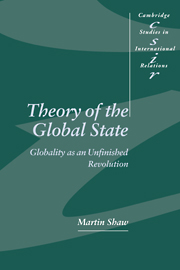1 - Introduction: globality in historical perspective
Published online by Cambridge University Press: 07 October 2009
Summary
At the beginning of the twenty-first century, there is a sense of living in a period of great change, which goes far beyond the coincidence of the new millennium. As ever in the modern world, there is a sense of traditional cultures and institutions under challenge from remorseless technological change and commercial expansion. At the same time, there is a profound sense of a significant historical movement: that the processes of change in our time are different from those that, in earlier periods, have made modernity.
There is deep uncertainty, however, about the definition of change. It is not clear what kind of transition this is, what sort of world it is producing, or whether it is desirable. Although there is a widespread sense of transformation, the problem of understanding is exacerbated by the difficulty of applying previous concepts of change to the new situation. As in all big transitions, the nature of change is a part of the novelty of the change itself. To illustrate this point, I shall explain later why the concept of revolution is appropriate to the current transformation. But this is not just another revolution in the sense in which revolutions have been understood in the nineteenth and twentieth centuries. In the present transition, the nature and meaning of revolution are also changing.
The aim of this book is therefore no less than an answer to the question of defining the change that is taking place.
- Type
- Chapter
- Information
- Theory of the Global StateGlobality as an Unfinished Revolution, pp. 1 - 22Publisher: Cambridge University PressPrint publication year: 2000



